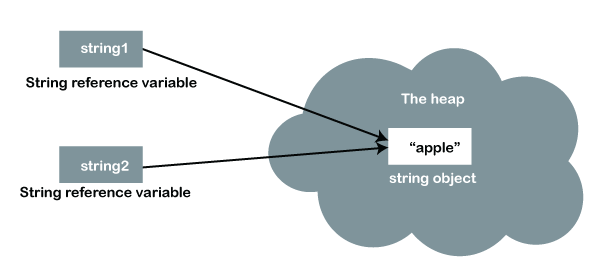Why Are Strings Immutable in Java? Insights into Memory Efficiency
Why Are Strings Immutable in Java? Insights into Memory Efficiency
Blog Article
What Is Immutable Strings and Just How It Functions
In the realm of programs, understanding the concept of unalterable strings is critical for developing safe and secure and durable applications. Unalterable strings refer to strings that can not be altered after they are produced, guaranteeing data stability and predictability within the code. This basic principle plays an important duty in numerous programs languages and supplies an unique technique to taking care of data. By exploring the intricacies of just how unalterable strings work, one can reveal a world of advantages and possibilities that can boost the high quality and effectiveness of software application advancement.
The Fundamentals of Immutable Strings
Immutable strings, as a basic principle in programming, are personality series that can not be altered once they are produced. This indicates that once a string is appointed a value, that value can not be changed. In languages like Python and Java, strings are immutable things, resulting in numerous effects in regards to memory management and information honesty.
Among the essential benefits of unalterable strings is that they offer a feeling of protection in information adjustment. Because the content of an unalterable string can not be modified, it makes sure that the original information continues to be intact, decreasing the threat of unintended modifications throughout program implementation (Why are strings immutable in Java?). This home additionally streamlines debugging processes, as developers can rely on that as soon as a string is defined, its value will not be accidentally altered
When a brand-new string is developed based on an existing one, rather than changing the original string, the brand-new worth is stored separately. Generally, comprehending the essentials of unalterable strings is critical for mastering shows principles and enhancing code effectiveness.
Benefits of Unalterable Strings
Structure upon the protection and effectiveness advantages of unalterable strings, their advantages encompass boosting code integrity and simplifying concurrent programming jobs. By being immutable, strings can not be customized after development, which gets rid of the threat of unexpected adjustments in the information they save. This intrinsic immutability guarantees that once a string is created, its value stays consistent throughout the program's implementation, minimizing the chances of pests triggered by unforeseen modifications.
Furthermore, immutable strings add to code integrity by making it much easier to reason concerning the state of a program. Considering that strings can not be transformed, designers can trust that a string will always hold the same worth, streamlining debugging and upkeep efforts. This predictability results in much more trustworthy and steady codebases.

Implementation in Programs Languages
Within various shows languages, the consolidation of unalterable strings is a fundamental facet that impacts how data is taken care of and adjusted within code structures. The execution of immutable strings varies across various programming languages, with each language providing its own systems to sustain this idea.

On the other hand, languages like C and C++ do not have built-in assistance for unalterable strings. Developers in these languages have to by hand carry out immutability by imposing rules within their code to stop direct modifications to string items.
Best Practices for Dealing With Immutable Strings
When dealing with unalterable strings in programming languages like Java and Python, adhering to finest practices makes sure safe and secure and efficient information control. Among the essential ideal practices is to make use of StringBuilder or StringBuffer rather than directly manipulating strings, particularly when taking care of extensive concatenation procedures. These courses offer mutable choices for string control, assisting to stay clear of unneeded memory allotments and improving efficiency.
An additional best technique is to utilize string interpolation or formatting operates provided by the language as opposed to hand-operated concatenation. This not just boosts readability but likewise help in preventing usual challenges such as unintended string adjustments. Additionally, when working with sensitive data such as passwords or API tricks, it is essential to stay clear of keeping them as ordinary message in unalterable strings. Utilizing protected storage systems like char ranges or specialized libraries for handling sensitive information helps alleviate safety threats associated with immutable strings.
Real-world Applications and Examples
Discovering useful implementations of unalterable strings in various sectors discloses their significant effect on information honesty and system dependability. In the health care sector, unalterable strings play an essential duty in making sure the safety and security and confidentiality of patient information. By preventing unapproved modifications to sensitive details such as medical documents and prescriptions, immutable strings aid preserve compliance with rigorous privacy laws like HIPAA.
Banks also profit from the immutable nature of strings to boost the security of client data and purchase documents. Immutable strings aid prevent fraudulence and unapproved alterations to economic information, giving a robust protection against cyber risks and making sure the trust fund and confidence of customers.

Verdict
Ideal techniques for functioning with immutable strings consist of staying clear of direct adjustments and making use of methods that return brand-new string objects. Real-world applications of immutable strings consist of data file encryption, caching, and string manipulation tasks.
Immutable strings refer to strings that can not be altered after they are produced, making sure data honesty and predictability within the code. When a brand-new string is produced based on an existing one, instead than modifying the initial string, the new value is stored individually.In languages like Java and Python, strings are unalterable by default, indicating that as soon as a string things is produced, its worth can not be pop over to this web-site transformed - Why are strings immutable in Java?. Ideal practices for working with immutable strings consist of preventing direct alterations and utilizing approaches that return new string items. Real-world applications of unalterable strings consist of information file encryption, caching, and string control tasks
Report this page